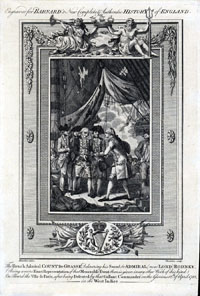Francois-Joseph-Paul de Grasse-Rouville, Comte de Grasse (1722-1788)

Francois-Joseph-Paul de Grasse-Rouville, Comte de Grasse, was the French Admiral who won the Battle of the Capes, stopped the British navy from reinforcing Yorktown, and ensured Cornwallis' surrender and the end of the American War for Independence. His defeat at the Battle of the Saintes in 1782, however, allowed the British to hold onto the West Indies.
Born on September 13, 1722, to an aristocratic family near Grasse, France, he entered the French navy in 1704 at the age of 17. By 1747, Grasse had been promoted to Ensign and served in a number of major naval conflicts against British fleets during the War of Austrian Succession. He was seriously wounded and then captured in battle off Finisterre, remaining in England for three months before his exchange. He was promoted to Lieutenant in 1754 and received his own ship, the Zephyr, in 1757. Promoted to Captain in 1762, his commands took him to India, the West Indies, and the Mediterranean. Shortly after the alliance between France and the United States was signed in 1778, he commanded a squadron in the indecisive Battle of Ushant off the Breton coast in late July (which generated a major British political controversy between two naval officers, Admiral Augustus Keppel and Sir Hugh Palliser). Grasse then served in the West Indies, where he performed with particular distinction in engagements against Admiral George Rodney.
Grasse's talent gained the attention of King Louis XVI and the Marquis de Castries, France's Secretary of the Navy. Grasse became an Admiral in 1781 and got command of a fleet of 20 ships of the line and three frigates with orders to capture the British sugar islands. He captured Tobago and 1,000 British soldiers on June 1, 1781. In July, Grasse received orders to support Rochambeau's movement against Cornwallis in the Chesapeake. His timely arrival sealed Cornwallis' fate as Grasse defeated Admiral Thomas Graves in the Battle of the Capes in early September and prevented the British navy from reinforcing or withdrawing Cornwallis.
After Cornwallis' surrender, Grasse returned to the West Indies. He captured St. Eustatius in late November 1781, and then St. Kitts on February 12, 1782, along with 1,100 men. Grasse suffered a catastrophic defeat, however, at the hands of Rodney on April 12, 1782, at the Battle of the Saintes. One of the few pitched naval battles of the war, Rodney captured seven ships of the line, several other vessels, and Grasse himself. The battle effectively ended French military and naval activities in the Caribbean and put the British in a much stronger negotiating position in the peace negotiations.
After his capture, Grasse was sent to London, where he engaged in informal peace talks with British ministers. He was paroled in August 1782 and returned to France to defend himself against charges of incompetence in the defeat at the Saintes. He demanded a court-martial and proceeded to blame his subordinates for any and all miscues; when they were exonerated in 1784 Grasse earned the ire of the King by agitating for his intervention. Grasse remained estranged from the King for most of the rest of his life. He died in Paris on January 14, 1788.
During the French Revolution, Grasse's four daughters escaped to America and settled with their brother in Charleston, South Carolina. After an initial grant of $1,000 to each of them, in 1798 Congress awarded them a pension of $400 per year for five years. Two daughters died of yellow fever in 1799, but the other two survived, married, and remained in the United States.




